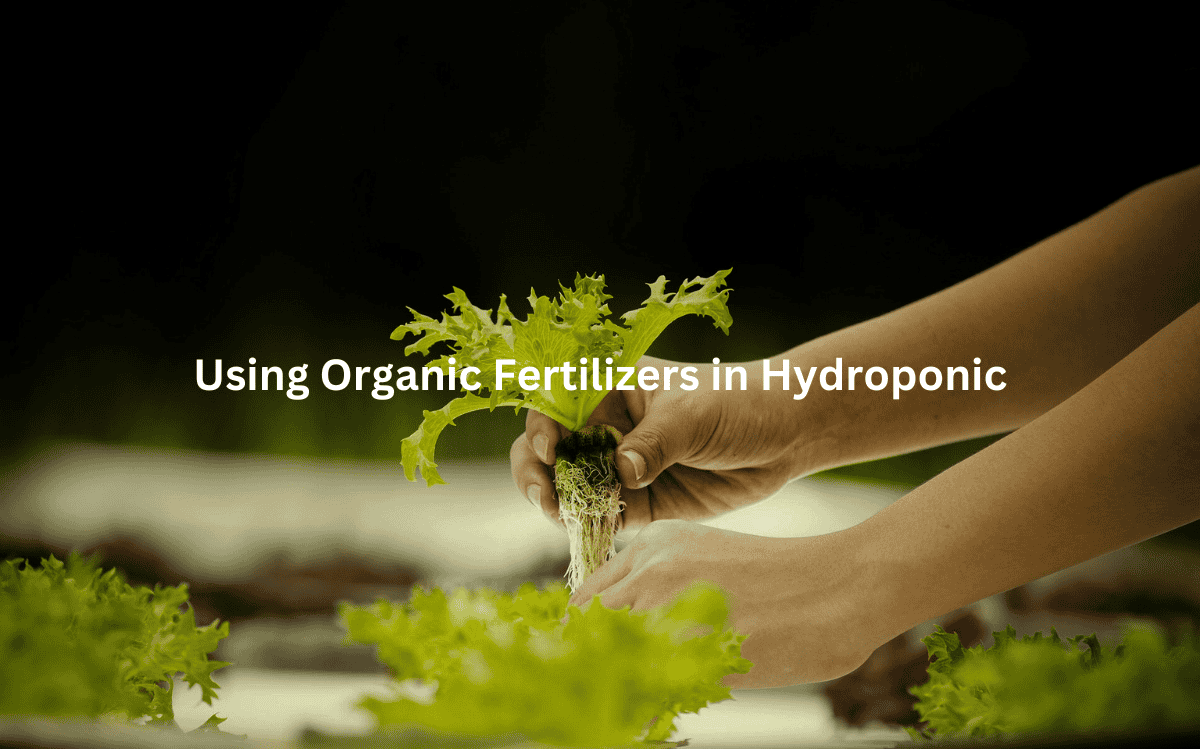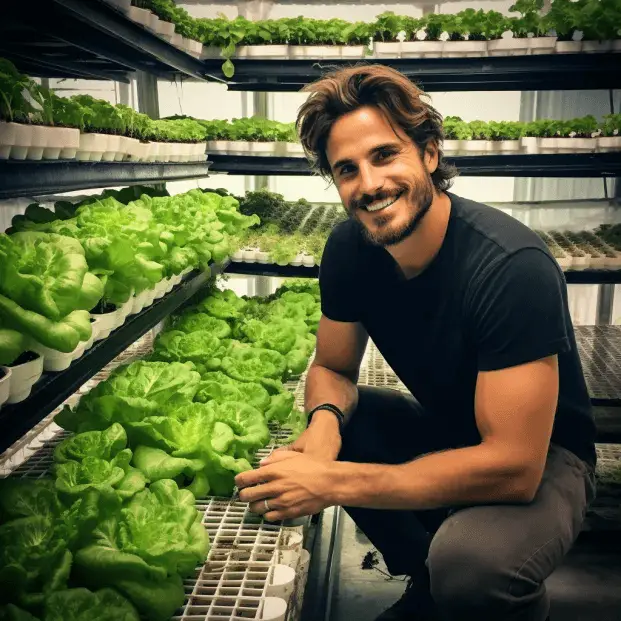Discover the best organic hydroponic nutrients for soilless gardening. Get tips to boost plant health and growth in your hydroponic system!
Growing plants without soil is pretty cool, right? You can do it with organic hydroponic nutrients! These nutrients are special because they help plants grow healthy in just water. It’s like giving them all the food they need without dirt. (1)
To start, mix the nutrients with water and place your seeds or seedlings into the solution. Watch them soak it up and grow tall! The best part? You can create a little garden right on your kitchen counter. So, keep reading to learn more about using organic hydroponic nutrients. Watch your plants flourish!
Key Takeaway
- Organic nutrients come from natural sources and are great for plant health.
- You can make your nutrient solutions using compost tea, fish emulsion, and seaweed extract.
- Monitoring pH and EC levels is important for healthy plant growth.
What Are Organic Hydroponic Nutrients?
Plants don’t care where their food comes from—it’s there. But in organic hydroponics, the source matters. Growers use natural nutrients from decomposed plants, fish waste, and sea minerals. It’s a way to feed plants without chemical residues. (2)
Hydroponic nutrients must provide macronutrients, like nitrogen, phosphorus, and potassium. Other than that, micronutrients like iron and magnesium are also important. Organic additives improve nutrient uptake and plant metabolism. This approach supports root health, boosts disease resistance, and encourages balanced plant growth.
A hydroponic system using organic fertilizers needs careful nutrient management. Water quality affects nutrient availability, and pH levels must stay between 5.5 and 6.5. Organic solutions can cause algae growth or clogging. So it might need filtering equipment to help keep things running smoothly. Done well, soilless gardening with organic nutrients is both sustainable and productive.
How to Make Organic Nutrient Solutions for Hydroponics
Making organic nutrients is like making soup for plants! You start with organic waste, break it down with helpful microbes, and turn it into a liquid that plants can absorb easily.
Key Ingredients:
- Compost Tea – Soak compost in water with air bubbles for 24 hours. This releases nutrients and good bacteria.
- Fish Emulsion – Liquid made from fish waste that adds nitrogen for plant growth. Always dilute it before using it.
- Seaweed Extract – Provides important minerals that help plants stay healthy and fight diseases.
Step-by-Step Guide:
- Gather Materials – You’ll need a 5-gallon bucket, an air pump, and a fine mesh filter.
- Mix Ingredients – In one gallon of water, add:
- 1 cup of compost tea
- 2 tablespoons of fish emulsion
- 1 tablespoon of seaweed extract
- Check pH Levels – Keep the mix between 5.5 and 6.5. Use liquid calcium or magnesium sulfate if needed.
- Strain and Use – Filter the mixture to remove solids before adding it to your hydroponic system.
Check nutrient levels regularly. Keep EC levels in the right range for your plants. Make fresh solutions every week to keep them effective. It’s an easy way to feed plants naturally in organic hydroponic systems! (3)
Using Organic Fertilizers in Hydroponics

Hydroponic gardening with organic fertilizers takes patience. Unlike synthetic nutrients, organic options break down. It relies on beneficial microbes to make nutrients available to plants.
Best Practices:
- Choose the Right Fertilizer – Liquid fertilizers work best. They dissolve easily and don’t clog the system.
- Keep It Clean – Unfiltered particles lead to blockages. Always strain organic nutrient solutions before use.
- Watch pH and EC Levels – Organic solutions fluctuate more than synthetic ones. Check pH levels daily, keeping them between 5.5 and 6.5.
Hydroponic systems need consistent maintenance. Water quality influences nutrient availability, and imbalances can slow plant development. Regular testing ensures plants get the right nutrients without buildup or deficiencies.
Boosting Hydroponic Growth with Organic Additives
Some organic additives go beyond basic nutrition. It helps plants grow faster, resist diseases, and even improve flavors.
Effective Additives:
- Seaweed Extracts – Rich in sulfate trace elements and boosts disease resistance. It also enhances plant metabolism.
- Humic Acids – Improve nutrient uptake, speeding up root growth and plant development.
Organic hydroponics is about creating an environment where they thrive. The right additives improve nutrient absorption and support microbial life. It can also enhance plant health without synthetic chemicals.
Tips for Successful Organic Hydroponics
Organic hydroponic systems need regular care. Balancing nutrient levels and monitoring water quality helps prevent common issues. This includes issues like algae growth or nutrient deficiencies.
Key Tips:
- Manage Your Nutrient Solution – Adjust nutrient concentrations based on plant growth stages. Young plants need more nitrogen while flowering plants need phosphorus and potassium.
- Watch Your Water Quality – Use clean, filtered water to prevent contamination. It is also important to ensure proper nutrient uptake.
A well-maintained hydroponic system produces high-quality crops without chemical residues. Organic hydroponics can be a reliable method for sustainable gardening. Of course, with proper nutrient management.
FAQ
What Are Organic Hydroponic Nutrients, and How Do They Work?
Organic hydroponic nutrients are natural nutrients used in soilless gardening. To feed plants without synthetic chemicals. They come from sources like compost tea, fish emulsion, and seaweed extract. These provide important macronutrients plus micronutrients that plants need.
Beneficial microbes and humic acids help roots absorb nutrients better to hydroponics. To keep everything balanced, growers check pH levels and EC levels. This is to make sure the nutrient solution is of the right amount for plant growth and development.
Can You Use Compost Tea and Fish Emulsion in a Hydroponic System?
Yes, but they need to be filtered so they don’t clog the hydroponic system. Compost tea adds beneficial microbes. It improves nutrient uptake and helps with disease resistance. Fish emulsion is a great source of nitrogen and other natural nutrients.
To keep water quality high, use filtering equipment and check EC levels often. A balanced nutrient solution helps prevent root rot and keeps plants healthy. This makes these organic additives great for hydroponic gardening.
How Do pH Levels and EC Levels Affect Organic Hydroponic Systems?
pH levels and EC levels control how well plants absorb hydroponic nutrients. Most hydroponic plants do best with a pH between 5.5 and 6.5.
EC levels measure how strong the nutrient solution is. If EC is too low, plants may not get enough macronutrients and micronutrients. If it’s too high, they can get too much. Checking these levels regularly helps prevent nutrient deficiency. It also keeps roots healthy and improves plant growth in soilless gardening.
What Role Do Organic Fertilizers Play in Nutrient Management?
Organic fertilizers give plants the nutrients they need without synthetic chemicals. Examples of organic fertilizers are fish emulsion, seaweed extract, and plant-based fertilizers.
Good nutrient management means making sure plants get the right mix of nutrients. This includes both macronutrients and micronutrients. Additives like humic acids and microbial inoculants help plants absorb nutrients better. Clean water and a balanced nutrient solution prevent problems. Sustainable agriculture methods can also help keep nutrients cycling naturally. Examples are using organic waste and homemade solutions.
What Are the Best Organic Additives for Hydroponic Plant Growth?
Some natural additives can help hydroponic plants grow better:
- Seaweed extract makes plants grow faster and helps fight diseases.
- Humic acids help roots absorb nutrients more easily.
- Microbial inoculants add good microbes that improve root health and plant development.
Keeping water clean and adjusting pH levels helps these nutrients work better. When everything is balanced, plants grow stronger and produce better crops.
How Do You Maintain Water Quality in Organic Hydroponics?
Good water quality is key for healthy hydroponic plants. Using clean water and filtering equipment keeps out harmful particles. It also prevents algae growth.
Organic fertilizers can add organic matter to the system. Proper aeration and nutrient management help keep things balanced. Checking pH levels and EC levels often helps keep the nutrient solution stable. Sustainable gardening methods, like using plant-based fertilizers, also support long-term plant health.
Why Do Plants Need Macronutrients and Micronutrients in Hydroponic Gardening?
Plants need two types of nutrients to grow:
- Macronutrients help plants build strong roots, stems, and leaves.
- Micronutrients support plant health and metabolism.
Organic hydroponics provide these nutrients. Humic acids and beneficial microbes help plants absorb them. Keeping pH levels and EC levels balanced stops nutrient problems and keeps plants growing strong in hydroponic systems.
Conclusion
This guide shows how to use organic hydroponic nutrients. To make plants strong and healthy. You can use natural ingredients like compost tea to give your plants the vitamins they need. It’s super important to check your pH and EC levels to keep everything balanced. This way, your plants will soak up all the good stuff and grow well. So grab your supplies and happy gardening!
References
- https://plantneeds.com.au/blog/2024/09/10/hydroponic-nutrients-and-gardening-comprehensive-guide/#
- https://www.trees.com/gardening-and-landscaping/organic-hydroponics
- https://loyalfertilizer.com/blog/organic-hydroponic-fertilizer/
Related Articles
- https://tophydroponicgarden.com/hydroponics-for-beginners/
- https://tophydroponicgarden.com/hydroponic-garden-maintenance/
- https://tophydroponicgarden.com/nutrients/
Was this helpful?

I’m Barrie L., a passionate hydroponic gardening enthusiast dedicated to cultivating thriving, soil-less gardens. With a focus on all things hydroponic, I share my expertise on innovative growing techniques and sustainable practices through my blog, tophydroponicgarden.com. As a seasoned hydroponics specialist, my goal is to inspire and guide fellow gardeners in harnessing the power of water-based cultivation for bountiful and eco-friendly harvests. I’m also an author of the book “Hydroponics For Absolute Beginners: Your Step By Step Guide For How To Create An Hydroponics System At Home Without Soil, For Growing Vegetable, Fruit And Herbs.” which is sold on Amazon. Join me on a journey of redefining the way we cultivate plants, one nutrient-rich solution at a time. Happy growing!


